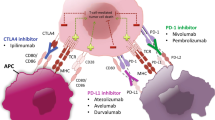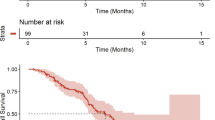Abstract
Objectives
UNBS5162 is a novel naphthalimide that binds to DNA by intercalation and suppresses CXCL chemokine elaboration. A Phase I study of UNBS5162 was conducted to establish pharmacokinetics (PK), maximum tolerated dose (MTD), dose-limiting toxicity, safety and anti-tumor activity in patients with advanced solid tumors or lymphoma.
Methods
UNBS5162 was administered in a 3 + 3 dose escalation scheme by intravenous infusion over 1 h weekly for 3 weeks of a 4-week cycle. Safety, serial serum PK and tolerability were captured throughout the study. Response Evaluation Criteria in Solid Tumors was utilized every 2 cycles to assess for anti-tumor response.
Results
Twenty-four patients with metastatic carcinoma and 1 patient with lymphoma were treated at eight dose levels (18–234 mg/m2). All patients were evaluable for tolerability and toxicity. Grade 3 toxicities include nausea (n = 1), fatigue (n = 1) and anorexia (n = 1). Prolongation of QTc [Hodges] was observed in 6 cases (Gr 1 = 2; Gr 2 = 2; Gr 3 = 2). C max and area under the curve increased linearly with dose with a t 1/2 of 30–60 min. 16 patients completed 2 cycles of therapy, all with pharmacodynamics at 8 weeks.
Conclusions
The MTD or dose-limiting toxicity for UNBS5162 was not reached due to the magnitude of QTc prolongation at the highest dose of 234 mg/m2/week that led to study termination.


Similar content being viewed by others
References
Brana MF, Ramos A (2001) Naphthalimides as anti-cancer agents: synthesis and biological activity. Curr Med Chem Anticancer Agents 1:237–255
Ratain MJ, Mick R, Berezin F et al (1993) Phase I study of amonafide dosing based on acetylator phenotype. Cancer Res 53:2304–2308
Ratain MJ, Rosner G, Allen SL et al (1995) Population pharmacodynamic study of amonafide: a cancer and leukemia group B study. J Clin Oncol 13:741–747
Mijatovic T, Mahieu T, Bruyère C et al (2008) UNBS5162, a novel naphthalimide that decreases CXCL chemokine expression in experimental prostate cancers. Neoplasia 10(6):573–586
Van Quaquebeke E, Mahieu T, Dumont P et al (2007) 2,2,2-Trichloro-N-({2-[2-(dimethylamino)ethyl]-1,3-dihydro-1H-benzo[de]isoquinolin-5yl}carbamoyl) acetamide (UNBS3157), a novel non-hematotoxic naphthalimide derivative with potent anti-tumor activity. J Med Chem 50:4122–4134
Trotti A, Colevas AD, Setser A et al (2003) CTCAE v3.0: development of a comprehensive grading system for the adverse effects of cancer treatment. Semin Radiat Oncol 13(3):176–181
Hodges M, Salerno Q, Erlien D (1983) Bazett’s QT correction reviewed. Evidence that a linear QT correction for heart rate is better. J Am Coll Cardiol 1:694
Michaels S., Brown, DM. Preclinical development of novel naphthalimide formulations. Experimental and Molecular Therapeutics 41: Antiangiogenesis. Abstract #4576 [Proc Am Assoc Cancer Res, Volume 45, 2004]
Chen Z, Liang X, Zhang H et al (2010) A new class of naphthalimide-based antitumor agents that inhibit topoisomerase II and induce lysosomal membrane permeabilization and apoptosis. J Med Chem 53(6):2589–2600
Wang J, Wu A, Xu Y et al (2009) M(2)-A induces apoptosis and G(2)-M arrest via inhibiting PI3K/Akt pathway in HL60 cells. Cancer Lett 283(2):193–202
Allen SL, Kolitz JE, Lundberg AS et al (2010) Phase I trials of amonafide as monotherapy and in combination with cytarabine in patients with poor-risk acute myeloid leukemia. Leuk Res 34(4):487–491
Acknowledgments
We wish to thank the patients and their families, clinical research support services (CRSS) at the Arizona Cancer Center, Mayo Clinic, AZ, USA and Virginia G. Piper Cancer Center at Scottsdale Healthcare, Nikki Barkett RN and Drias Pharmaceuticals for support.
Conflict of Interest
The authors declare that they have no conflict of interest.
Author information
Authors and Affiliations
Corresponding author
About this article
Cite this article
Mahadevan, D., Northfelt, D.W., Chalasani, P. et al. Phase I trial of UNBS5162, a novel naphthalimide in patients with advanced solid tumors or lymphoma. Int J Clin Oncol 18, 934–941 (2013). https://doi.org/10.1007/s10147-012-0475-8
Received:
Accepted:
Published:
Issue Date:
DOI: https://doi.org/10.1007/s10147-012-0475-8




